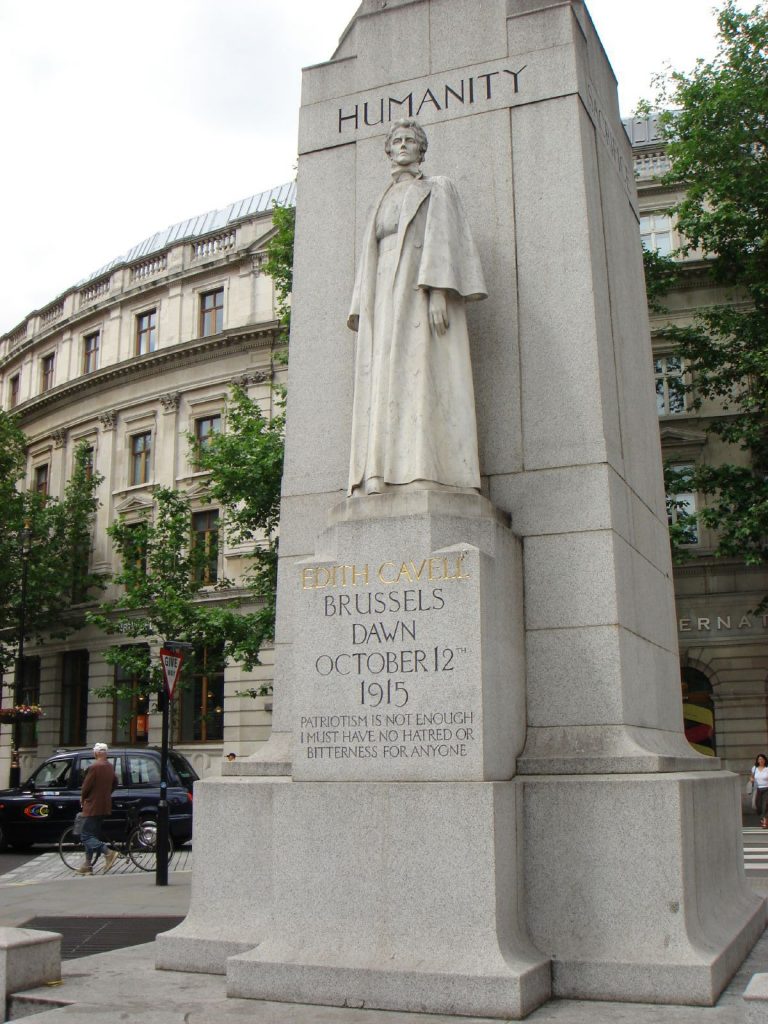
Monument to Edith Cavell: ‘Patriotism is not enough. I must have no hatred or bitterness for anyone.’ Photo: virtusincertus, Flickr
Our columnist considers the fine line between patriotism and nationalism.
Patriotism. The last refuge of a scoundrel, they say, or the first refuge of an intolerant bastard like Tommy Robinson. With the FIFA marketing jamboree disguised in a cloak of football that is the World Cup in full swing, patriotism worldwide is being ramped up. Colombia is no exception.
To be fair, Colombia needs little excuse to get out the flags and bunting at the best of times and the country is usually full of flags and national symbols anyway. Not to mention the need to yell out ‘Co-lom-bi-a!’ in pretty much every song produced in the country.
Being English, patriotism doesn’t sit well with me at all. Like most people of my generation, the Union Jack (and worse yet, the St George’s Cross) is something we’re used to seeing on National Front marches or wrapped around the shoulders of a twatriot like Morrissey. It’s the visual to a soundtrack of racism (for example: “there ain’t no black in the Union Jack”) and violence.
There’s a fine line, you see, between patriotism and its nastier big brother: nationalism. At its core, patriotism deliberately seeks to exclude and alienate. Especially here, where Alvarito ‘el motosierra’ used it so well in his campaign to exploit patriotism for his own nefarious schemes. Criticise him, and you criticise your country – you become a traitor.
There’s a whole generation of Colombian kids who think they have to always support ‘Colombia’ in everything. Align yourself as ‘Colombian’ and you can get away with a hell of a lot. See also Escobar’s schemes to avoid deportation under the flag of national sovereignty.
Patriotism as a concept is a bit of a daft idea, if you bother to think about it. After all, it’s entirely dependent on your birth, which is pretty much the last thing you have a choice over. Worse, yet, it’s not just in the UK that it often serves to mask pretty awful racism. It’s based on an idea of celebrating a fucking passport, for Christ’s sake. I mean, countries are artificial constructs in the first place, something to divide us from our common humanity.
There’s also something so horribly, tastelessly, boringly vanilla about patriotism. It’s so mainstream, isn’t it? It’s the Boyacá of ideologies, something that requires not much thought and gives so little in terms of intellectual stimulation. Like Friends, it’s designed for a load of people who all think and look the same to vapidly drink in like lobotomized human bobbleheads who breathe through their mouths.
There’s nothing wrong with liking, or even loving, Colombia. After all, I do. That’s why I’ve chosen to make this my long-term home for the future. But there’s a key difference: choice. I certainly don’t love the Disunited Kingdom, headed as it is by the Royal Parasites. There are things to like about Britain; there are things to be ashamed of. I don’t support the treatment of immigrants to the UK; the repression of the Celts; the shameful treatment of gay men in the fifties; the atrocities of Empire.
Having said all that, Colombians are fairly good at patriotism. The blood-soaked past here is internal, not external. There’s no empire to be ashamed of, this nation was instead born from the ashes of the Spanish Empire. Colombia as a nation chose to be born; chose to be what it is.
Consider, though, the recent treatment of Venezuelans in Colombia. For the first time in a long time, the boot is on the other foot and there’s no shortage of anti-Venezuelan sentiment, from the usual suspects such as the Uribista campaign right down to average corrientazos advertising specifically for ‘meseros colombianos’. What, too, of the indigenous communities excluded for so long from the vision of Colombia, forced onto the margins of society? They’re allowed to be Colombian now, but for a long time they weren’t.
In the end, I choose to follow the words of Edith Cavell, inscribed on her monument at the bottom of St Martin’s in London: “Patriotism is not enough. I must have no hatred or bitterness for anyone.” She declared that love for your country implies a corresponding belief that other places are not the same; are not equal. That isn’t OK.
Oli Pritchard has been writing for The Bogotá Post since the very first edition. He’s tried his hand at every section from news to sport – including our only attempt at satire. A fan of Partridge, Nathan Barley and Monkey Dust, he’s been slipping references to Garth Marenghi’s Darkplace into the paper for years. Now we’ve let him off the leash and given him his very own column. He hasn’t got the tagline of ‘gives it to you straight’ yet.





